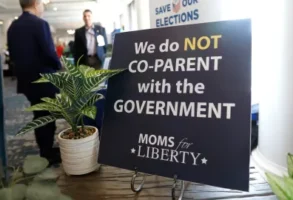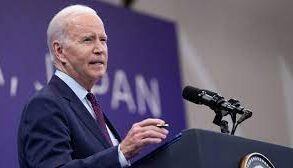Patrick T. Brown
Fellow
Patrick T. Brown is a fellow at the Ethics and Public Policy Center, where his work with the Life and Family Initiative focuses on developing a robust pro-family economic agenda and supporting families as the cornerstone of a healthy and flourishing society.
Patrick T. Brown is a fellow at the Ethics and Public Policy Center, where his work focuses on developing a robust pro-family economic agenda and supporting families as the cornerstone of a healthy and flourishing society.
His writing has been published in The New York Times, National Review, Politico, The Washington Post, and USA Today, and he has spoken on college campuses and Capitol Hill on topics from welfare reform to child-care and education policy.
He has published reports on paid leave and family policy with the Institute for Family Studies, and edited an essay series featuring working-class voices for American Compass. He is an advisory board member of Humanity Forward and the Center on Child and Family Policy and a contributing editor to Public Discourse.
Prior to joining EPPC, Patrick served as a senior policy advisor to Congress’ Joint Economic Committee. There, he helped lead research about how to make it more affordable to raise a family and more effectively invest in youth and young adults. He also previously worked a government-relations staffer for Catholic Charities USA.
Patrick graduated from the University of Notre Dame with a degree in political science and economics. He also holds a Master’s in Public Affairs from Princeton University’s Woodrow Wilson School of Public and International Affairs. He and his wife Jessica have four young children and live in Columbia, S.C.
Pro-Lifers Shouldn’t Be Afraid To Condemn Trump for Abortion Remarks
Patrick T. Brown

In a second Trump administration, the former president said, a national compromise on abortion would be forthcoming.
Newsweek / September 20, 2023
The parents’ rights movement needs to avoid this tea party mistake
Patrick T. Brown

Republicans’ commitment to prioritizing parents’ rights — the idea that the ultimate authority for children’s education rests with their parent — continues to drive much of the conversation around K-12 public education.
CNN Opinions / September 19, 2023
What ‘Painkiller’ Omits About the Opioid Crisis
Patrick T. Brown

Netflix’s OxyContin series offers a comic-book version of a complex story.
The Dispatch / September 2, 2023
Is Limited Government the Best Pro-Family Policy?
Patrick T. Brown

A new report from the Cato Institute lays bare real fault lines between a conservative and libertarian approach to supporting families.
Institute for Family Studies / August 28, 2023
Why the GOP should embrace a pro-worker agenda
Patrick T. Brown

Republicans can seek to help workers while helping businesses to grow.
Deseret News / August 10, 2023
For Republicans, the Ohio election result should set off a five-alarm fire
Patrick T. Brown

The result in Ohio’s vote on a change to its referendum law underscored a political reality that Republicans are still coming to grips with.
CNN Opinion / August 9, 2023
DeSantis is trying to climb the Trump wall
Patrick T. Brown

For DeSantis to succeed in winning the nomination, he needs to attract both Republicans who have some hesitations about former President Donald Trump and some who supported him but would prefer a candidate with less baggage.
Articles
CNN / July 28, 2023
Moving Past the Mommy Wars: Pro-Family Policy for the Rest of Us
Patrick T. Brown

It’s hard to pinpoint when America passed the peak of the mommy wars. Back in the early 2000s, it seemed as if you couldn’t open the morning paper, stop at a newsstand, or turn on the evening news without hearing about the conflict between working moms and their stay-at-home peers.
Articles
Fairer Disputations / July 21, 2023
Yes in My Backyard—and in My Frontyard
Patrick T. Brown

Being pro-family must also mean being pro-housing reform. If we want more neighborhood children playing in our front yards, we should be pushing their elected officials to make it easier for developers to build, baby, build.
Articles
Public Discourse / July 16, 2023
By Stepping Into the Culture War, the Dodgers Only Alienate Fans
Patrick T. Brown

Starting in Chicago in 2001, LGBT-themed nights at the ballpark have become common throughout the sport (the Texas Rangers remain the only MLB team not not to host one.)
Articles
Newsweek / June 2, 2023
Biden once supported work requirements for social benefits. Why he should do so again
Patrick T. Brown

A debt ceiling endgame could be in sight, even if an agreement is far from a sure thing. And part of the deal in helping America avoid default may be tightening work requirements on safety-net programs.
Articles
CNN / May 17, 2023
What conservatives can learn from Major League Baseball’s pitch clock
Patrick T. Brown

Baseball fans have always prided the game as being outside of time, and the introduction of a leaguewide pitch clock in Major League Baseball this offseason rubbed traditionalists the wrong way.
Articles
Deseret News / May 14, 2023
The irony was not lost on many—Roe v. Wade, the Supreme Court ruling legalizing abortion that motivated many religious and social conservatives to get into politics, was overturned in large part because of a man who was decidedly an outsider to those movements. And that marriage of convenience is now putting pro-lifers' ultimate aims at risk.
In 2016, Donald Trump overcame early missteps to make a strategic alliance with socially conservative groups, promising his judicial nominees "will be pro-life" and talking in vivid terms about late-term abortion in his final general election debate. Those stances cemented an unlikely, if fruitful, partnership between the Trump administration and activists dedicated to ending abortion—some of whom called him "the most pro-life president ever."
Much of that praise was vindicated when the Supreme Court overruled Roe last summer in Dobbs v. Jackson Women's Health Organization, which gave states the ability to set their own laws restricting abortion. But the politics of abortion have since shifted. And Trump—who has always demonstrated an above-average ability to sense which way the political winds are blowing—has adjusted his rhetoric in turn.
Earlier this year, Trump blamed "the abortion issue" for costing the GOP congressional seats in the 2022 midterms. In April, he rubbed anti-abortion advocates the wrong way by equivocating on the idea of a 15-week federal abortion ban. And this weekend, on NBC's Meet the Press, he went a step further.
In a second Trump administration, the former president said, a national compromise on abortion would be forthcoming. "We're going to agree to a number of weeks or months or however you want to define it.... It could be state or it could be federal. I don't, frankly, care." He explicitly ruled out a 15-week federal abortion ban (which would only touch 4 percent of all abortions performed nationwide) and called Florida's six-week abortion ban "a terrible thing and a terrible mistake."
With his tendency to attack first and ask questions later, parsing the former president's words too carefully is often a mistake. After all, Trump's political flexibility and lack of interest in the ideological and philosophical commitments that drive many conservatives have been assets for him. As Matthew Yglesias, then of Vox, wrote at the time, Trump would likely have lost in 2016 if voters hadn't seen him as being more ideologically moderate than his opponent, Hilary Clinton.
Similarly, his sandbagging of Florida's aggressive legislation on abortion is likely explained by his political rivalry with Gov. Ron DeSantis, who is currently fading in the GOP primary polling.
But a common thread in his abortion-related comments is that Trump sees himself as having delivered on his end of the bargain—overturning Roe—but holds no deeper commitment to the underlying issue. His shrug at the contours of a hypothetical deal and willingness to talk down pro-life wins at the state level is an understandable move of political self-preservation for a New York real estate developer. For pro-lifers, it's a flashing warning sign—Trump is willing to sell them out. And if he does, they may be politically homeless.
Pro-lifers, who undeniably benefited from the Trump White House's policy wins on abortion, need to hold him accountable.
But the pro-life movement should also take Trump's political reality check to heart. The post-Dobbs landscape is undeniably treacherous terrain for those opposed to abortion, as state initiatives in Kansas, Michigan, Kentucky, and elsewhere have demonstrated. While many advocates speak in a morally prophetic tone about abolishing abortion—a long-term aspiration many of us share—the reality facing pro-lifers is that laws without exceptions for rape and incest are politically untenable. (Every state with abortion prohibitions already includes exceptions for the life of the mother.)
There are plenty of areas of prudence and compromise that those committed to the pro-life cause can disagree with in good faith. For instance, former South Carolina governor Nikki Haley has an eminently valid point about a push for the 15-week federal ban on abortion. Such a bill would require 60 votes to pass the Senate, a threshold the GOP is multiple election cycles away from achieving. Spending too much rhetorical time and energy on a bill going nowhere can make it harder for conservatives to turn the tide of losses at state ballot boxes.
Pro-lifers should be celebrating states that have passed legislation to protect the unborn, not undermining them out of political expedience. It's no big secret that many D.C. consultant types have long wished for the Republican Party to drop its pro-life commitments and focus on economic issues. If Trump wins the GOP nomination with nothing more than a vague suggestion of lip service on abortion, those motivated to participate in politics by a commitment to the value of unborn human life may find themselves asked to take a back seat.
So far, the response from some pro-life groups has been to treat the former president with kid gloves, not even mentioning him by name. But the lesson conservatives should take from their fracturing alliance with Trump is not to "compromise" on only banning the most egregious cases of late-term abortion. It's that taking popular, politically moderate stances can appeal to voters in the middle, allowing politicians some leeway to exert political capital on the issues that matter. Gov. DeSantis, Georgia Gov. Brian Kemp, and Ohio Gov. Mike DeWine all signed the kind of abortion legislation Trump calls a "terrible mistake"—and all won reelection quite handily.
In next year's GOP primaries, a third Republican nomination for Donald Trump remains the most likely outcome. Religious and social conservatives face the difficult task of maintaining their relationships for a potential second term. But if they let the former president's comments' slide, they will be paving the way to their own irrelevance. In the weeks ahead, pro-life Republicans should be unafraid to condemn his abortion remarks for what they are—uninformed and inaccurate.
Patrick T. Brown is a fellow at the Ethics and Public Policy Center.